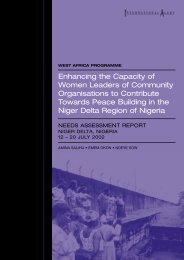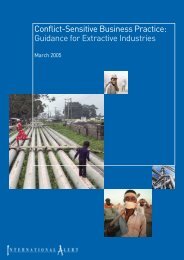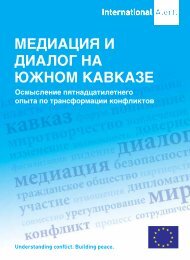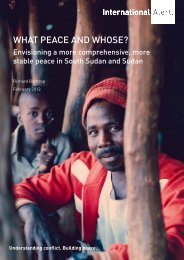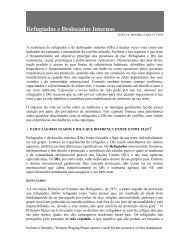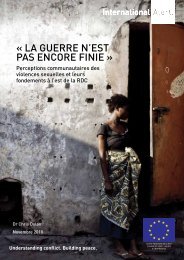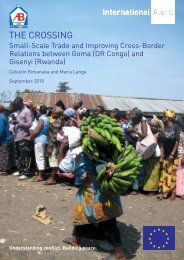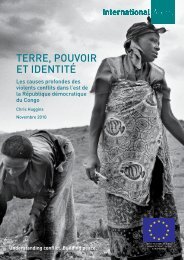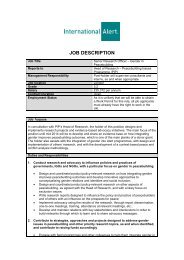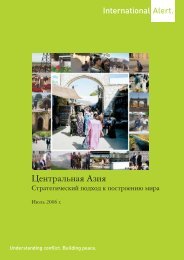52 • Women’s Bodies as a Battleground: Sexual Violence Against Women and Girls During the War in the Democratic Republic of Congo8Institutional Responses to Sexual Violence Against Women8.1 The powerlessness of local customary and administrativeauthoritiesIn this climate of general insecurity, the local customary and administrative authoritiesare as powerless in the face of combatants’ acts of violence as the people they aresupposed to protect, according to a number of victims who had <strong>report</strong>ed the violencethat had been perpetrated against them. This was certainly the case in Fizi, where 25%of the women who had been raped contacted the head of the neighbourhood, road,district or village where they lived. In the villages, victims went to the important elders.Generally speaking, the victims were disappointed with the apathy shown by thecommunal authorities, who themselves were powerless and terrorised by the presence ofthe soldiers. It is true that standing up to soldiers in this context requires considerablestrength and the few who are courageous enough to do it expose themselves toconsiderable risk, even of death. For example, when, in May 2003, one ofneighbourhood heads in the Mlenga district of Fizi dared to forbid soldiers from rapingwomen, he had to flee the town, pursued by the soldiers.Most of the authorities contacted during the survey said that the only thing they could dowas to commiserate with the victims and recommend that they avoid isolated and dangerousspots. The more daring among them said they had taken due note of the complaints andpromised to inform their superiors about them. But very often the customary chiefs simplytried to smooth things over, even going as far as to minimise the seriousness of the acts thathad been perpetrated, as in the case of one chief who told a mother who had been raped:“It was your children who did it, try to understand them”Some head men have actively supported the women. They have acted as mediators to helpdivided families, advising the husbands to give moral support to their wives and not abandonthem, and have also tried to provide moral and material support themselves, visiting thefamilies concerned to express sympathy on behalf of the community, supplying traditionalmedicines to the victims and paying transport costs for those women who wanted to go todistant health centres for treatment or to leave their community where they felt disgracedand vilified. However, will the Congolese national institutions provide any legislation to dealwith these sorts of attacks?8.2 Congolese law and rape: the lack of a gender perspectiveGender-based violence, in particular rape and other types of sexual violence is dealt with inCongolese legislation, yet there have virtually never been any convictions for rape, while thefighting forces have been raping and pillaging for years without any concrete steps beingtaken to put an end to these attacks on the most basic of human rights. In South Kivu, theRCD authorities, backed by Rwanda, were in charge during the war years and they continueto exert considerable influence in the province. However, they have done almost nothing toprotect women and girls from being raped by their own soldiers and by soldiers of enemyarmies and militias.
53 • Women’s Bodies as a Battleground: Sexual Violence Against Women and Girls During the War in the Democratic Republic of CongoThe victims are generally wary of lodging a complaint, both for fear of reprisals and because they do notwant to make public what has happened to them. In any case, the judiciary system as it operates in SouthKivu deters them from <strong>report</strong>ing the attacks, because the victim has to pay in advance a sum equivalentto $20 in order for the complaint to be admissible. Very few women living in the towns, and even fewerin the rural areas, could get hold of such a large sum, and even if they had the money, it would be requiredfor the needs of their families. This situation was confirmed by an examination of the archives of thePublic Prosecutor’s Office in Bukavu, which showed that, of the 1,341 cases heard between 1997 and2003, only 35 concerned sexual violence. Moreover, magistrates, who are often badly paid, if they arepaid at all, have to work in very difficult conditions. But there is also the political problem of how thelaw is interpreted and a lack of a gender perspective within the law. Congolese legislation does not dealclearly with these two problems, and there is therefore a gap in the law, which explains the rare instancesof convictions in the few cases of sexual violence that do come to court.How is rape defined in Congolese law and what sanctions are incurred by convicted rapists? The Decreeof 27 June 1960 and Edict No. 78-015 of 4 July 1978 relating to Article 170 of the Congolese Penal Codeas amended on that day prohibits the offence of rape committed against women and provides for asentence of 5–20 years’ hard labour for anyone who has committed rape, either by means of violence orserious threats, or by trickery.Congolese law defines rape as: “sexual union that a man imposes on a woman with the use of violence.In other words, the act in which a person of the male sex has relations with a person of the female sexagainst the will of the latter, whether the lack of consent results from physical or mental violence or fromany other means of constraint or from her having been taken by surprise.” 65In this definition the act of rape can only be the insertion of the man’s genital organ into the woman’sgenitalia and it is not rape if there is no coitus. Thus if rape is committed with the use of an object, inCongolese law it is not regarded as rape.In fact, Congolese law 66 establishes a hierarchy of different types of rape, and differentiates between rapeand indecent assault. Thus, the act of inserting into a woman’s vagina a finger, stick or any other objectagainst her will, or the act of breaking the hymen of a virgin by any other means than by inserting themale organ can be the subject of a prosecution either as an act of public outrage or as indecent assault.The same applies to homosexual acts.Furthermore, if a man uses violence to force a woman to have sex via the anus or the mouth, this is alsoregarded as indecent assault and not rape, while the offence of rape exists only when there is sexualintercourse. 67 The victim of rape can only be a woman. Therefore, no homosexual or similar kind of actcan be described as rape. This means that men cannot have the status of victim even though they, too, arebeing subjected in ever greater numbers to rape and sexual violence in situations of armed conflict inSouth Kivu.According to Congolese law, rape can only be regarded as such if sexual union has been obtained withthe use of violence. The notion of violence, which can be either physical or mental, likewise lends itself toa variety of interpretations. Physical violence, as considered here, is that which is directly deployed on thevictim. Under Congolese penal law, if a man forcibly removes a woman’s clothes, tears her clothes andunderwear and knocks her to the ground, but the woman then yields to him voluntarily, there is nopossibility of him being prosecuted for rape. With regard to psychological violence, this presupposes thatthe woman yielded only because of being in the grip of genuine fear of exposing herself, or her family, tosignificant and immediate harm. The same applies to a woman who yields only in order to save either herown life which is under threat from the attacker, or that of her parents, or that of her child, whom theattacker also threatens to kill.65.Likulia Bolongo, Droit pénal Spécial Zaïrois, T1, 2ème éd, 1985.66.Ibid.67.Ibid.



